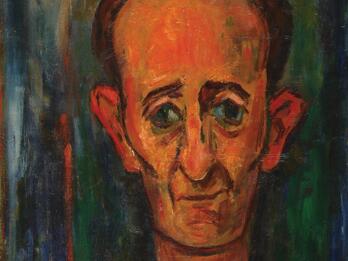Jacob Glatstein
Considered by many the most brilliant and innovative voice in Yiddish modernist poetry, Jacob Glatstein (Yankev Glatshteyn) was born and raised in Lublin, in the Polish reaches of the Russian Empire. In 1914, he moved to New York City, pursued a higher education in the American university system, and developed as an American Yiddish poet in sustained dialogue with Anglo-American modernism. He was among the founders of the In-zikh (Introspectivist) movement in Yiddish poetry, which reimagined Yiddish poetry as a site where modern Yiddish poets, liberated from any narrow expectations regarding either Jewishness or poetic tradition, would express their unique individual experience and working-through of modern life, addressing all dimensions of personal experience they deemed relevant (not only, say, “Jewish” ones) and using whatever formal means were called for. In the process, by drawing on all the unique resources of the Yiddish language itself (not excluding their own innovations) and simply by dint of speaking from their own individual experience and location, they would render Yiddish literature and culture far more modern, capacious, and appropriate to the intellectual and cultural needs of modern readers. Glatshteyn’s own iteration of this ideal in his early poetry was remarkably playful and inventive at every level of the poem, from always surprising and sometimes scandalous content to all sorts of experimentation in form—Glatshteyn was a pioneer of Yiddish free verse—and in language itself, as expressed in Glatshteyn’s skilled playing with sound and register. In the 1930s, Glatshteyn grew ever more concerned about the Jewish political situation in Europe. A growing sense of looming catastrophe, consolidated by a trip back to Poland in 1934 to visit his dying mother after twenty years away, increasingly colored his poetry and shaped his most important prose works, his two-volume autobiographical masterpiece Ven Yash iz geforn (When Yash Went Forth) and Ven Yash iz gekumen (When Yash Arrived) and his book for young people Emil un Karl (Emil and Karl). The destruction of East European Jewry had a deep impact upon Glatshteyn and profoundly changed his approach to Yiddish poetry. His long postwar poetic career was marked by a focus on the Holocaust, memory, the fate of Yiddish culture and collective Jewish fate; by a repudiation of the modernist confidence in the intrinsic good of human creativity and radical freedom that he had at least flirted with before the 1930s; and by a concomitant renunciation of the bravura formal experimentation that marked his debut, though he remained a master of poetic language. Glatshteyn also wrote many volumes’ worth of literary criticism and essays.


